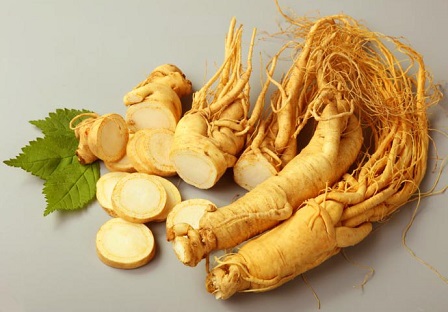University of Wollongong study reveals Ginseng as a potential ally against Monkeypox (Mpox) infections
Nikhil Prasad Fact checked by:Thailand Medical News Team Aug 22, 2024 1 year, 5 months, 3 weeks, 2 days, 53 minutes ago
Mpox News: In a revealing study review, researchers from the University of Wollongong, alongside collaborators from several international institutions, have discovered that Ginseng, a well-known herb in traditional medicine, might play a crucial role in combating infections caused by the Monkeypox virus (MPXV). This
Mpox News report delves into the study's findings and explores how Ginseng could be utilized as a complementary treatment option in the fight against this emerging infectious disease.
 University of Wollongong study reveals Ginseng as a potential ally against Monkeypox
University of Wollongong study reveals Ginseng as a potential ally against Monkeypox
(Mpox) infections
A Growing Concern: The Threat of Monkeypox
As the world continues to grapple with the ongoing effects of the COVID-19 pandemic, the resurgence of Monkeypox has become a new cause for concern. Monkeypox, a zoonotic virus that belongs to the Orthopoxvirus genus, shares similarities with the viruses responsible for smallpox and cowpox. First identified in 1958, the virus was predominantly found in African rodents and then monkeys, with occasional spillover to humans, particularly in Central and West Africa.
Recent outbreaks in non-endemic regions, including North America and Europe, have highlighted the virus's potential to spread beyond its traditional borders. The absence of a specific treatment protocol for Monkeypox has intensified the urgency to explore alternative therapies. Ginseng, a herb revered for its adaptogenic properties, has emerged as a promising candidate in this context.
Ginseng's Antiviral Properties
Ginseng, scientifically known as Panax ginseng, has been a cornerstone of traditional medicine in East Asia for centuries. Known as "the king of herbs," Ginseng has been widely used to enhance immunity and combat various diseases. The herb's potential antiviral properties have been the subject of numerous studies, with evidence suggesting its efficacy against a range of viruses, including influenza, hepatitis, and even HIV.
In this article, we explore how the recent study review conducted by the University of Wollongong and its international partners has provided new insights into Ginseng's role in combating Monkeypox. The study's findings indicate that Ginseng's immunomodulatory effects could be harnessed to enhance the body's natural defenses against the virus, making it a valuable addition to existing treatment strategies.
The Study: Uncovering Ginseng's Potential Against Monkeypox
The research team, which included scientists from the University of Wollongong's Institute for Superconducting and Electronics Materials (ISEM), Noakhali Science and Technology University in Bangladesh, and Sungkyunkwan University in South Korea, conducted a comprehensive review of Ginseng's antiviral activities. The study explored Ginseng's ability to modulate the immune system and its potential application in preventing Monkeypox infections.
&
amp;nbsp;
The researchers meticulously reviewed existing literature on Ginseng's antiviral properties and hypothesized that the herb could be effective in managing Monkeypox infections.
How Ginseng Boosts Immunity
Ginseng is known to enhance both innate and adaptive immunity, making it a potent ally in the fight against viral infections. Innate immunity provides the body's first line of defense against pathogens, with components such as macrophages, natural killer (NK) cells, and cytokines playing a crucial role. Ginseng has been shown to stimulate these components, increasing their activity and enhancing the body's ability to fend off infections.
For example, Ginsenosides, the active compounds in Ginseng, have been found to boost macrophage phagocytic activity, a process where macrophages engulf and destroy pathogens. These compounds also enhance the production of reactive oxygen species (ROS), which play a vital role in eliminating harmful microbes.
Additionally, Ginseng extracts have been shown to stimulate the production of cytokines such as interleukin-6 (IL-6) and tumor necrosis factor-alpha (TNF-α), which are crucial in coordinating the body's immune response.
In adaptive immunity, which involves the generation of memory cells that recognize and attack pathogens upon re-exposure, Ginseng has also shown promise. The herb has been found to regulate the production of antibodies and enhance the activity of T cells, which are critical in targeting and destroying infected cells.
Ginseng and Monkeypox: A Promising Future
The researchers behind the study believe that Ginseng could be a valuable tool in preventing and managing Monkeypox infections. While the virus is generally mild and self-limiting, severe cases can lead to complications such as pneumonia, sepsis, and encephalitis. The study suggests that Ginseng's immunomodulatory effects could help prevent the virus from progressing to these severe stages, making it an attractive option for at-risk populations.
Moreover, Ginseng's anti-inflammatory and analgesic properties could provide symptomatic relief for those suffering from Monkeypox. The herb's ability to reduce inflammation and pain could help manage the discomfort associated with the disease's skin lesions, which are a hallmark of Monkeypox infections.
The study also draws parallels between Monkeypox and smallpox, noting that Ginseng was historically used in China as a vaccine against smallpox. Given that both viruses belong to the same family, the researchers suggest that Ginseng could similarly benefit those infected with Monkeypox.
However, proper observational clinical trials and randomized clinical trials are needed to validate that Ginseng can help with Mpox infections.
Conclusion: The Road Ahead
The findings from the University of Wollongong study review offer a promising new avenue for combating Monkeypox infections. While further research is needed to confirm Ginseng's efficacy in clinical settings, the herb's potential as a complementary treatment cannot be overlooked. As the world continues to search for effective therapies against emerging infectious diseases, Ginseng may hold the key to enhancing the body's natural defenses and improving outcomes for those affected by Monkeypox.
The study findings were published in the peer-reviewed Journal of Ginseng Research.
https://www.sciencedirect.com/science/article/pii/S1226845323000283
For the latest
Mpox News, keep on logging to Thailand Medical News.
Read Also:
https://www.thailandmedical.news/news/computational-study-shows-that-phytochemicals-from-ficus-religiosa-exhibit-potential-for-combating-mpox-infections
https://www.thailandmedical.news/news/marine-fungi-could-hold-the-key-to-new-antiviral-treatments-for-monkeypox-mpox
https://www.thailandmedical.news/news/bisbenzimide-compounds-show-promise-in-combating-poxvirus-infections-including-monkeypox-mpox
https://www.thailandmedical.news/news/computational-study-identities-fda-approved-drugs-that-could-be-repurposed-to-treat-mpox-infections
https://www.thailandmedical.news/news/german-researchers-find-new-treatment-for-ophthalmic-mpox-infections
https://www.thailandmedical.news/news/u-s-nih-finds-that-tecovirimat-the-mpox-drug-many-countries-were-stockpiling-is-not-effective-against-the-new-clade-1-strain
https://www.thailandmedical.news/news/breaking-ivermectin-users-will-likely-suffer-severe-or-lethal-mpox-infection-due-to-diminished-interferon-gamma
